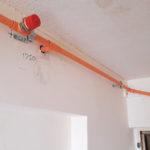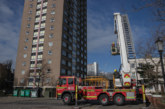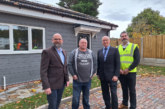Birmingham City Council fire safety programme aims to improve tenant safety and engagement while minimising disruption.
Tenant safety has always been the number one priority of Birmingham City Council. Since the Grenfell Tower tragedy, there has understandably been an increased focus on fire safety. Despite receiving zero funding from government, Birmingham City Council has taken the decision to retrofit sprinklers in all its 10,000 high-rise flats across the city at a cost of £31m. While the key objective is tenant safety, the council also wants tenants to feel informed and involved.
Birmingham City Council is Europe’s largest local authority, serving well over a million customers. Owning approximately 62,000 dwellings – around 10,000 of which are high-rise flats – it has more housing stock than any other local authority in the UK. Following the Grenfell Tower disaster, the council pledged to install sprinkler systems throughout its 213 high-rise residential tower blocks, at a cost of £31m.
Sharon Thompson, Cabinet Minister for Homes and Neighbourhoods at Birmingham City Council, explained why they took the decision: “Working in the public sector, first and foremost, our priority has to be about the public. So, for us, it wasn’t about fulfilling legal obligations; we have a moral commitment to our citizens and there’s no question about the action we needed to take. We could not ignore the crystal-clear evidence from the London Assembly and West Midlands Fire Service, which recommended the installation of sprinklers in high-rise blocks.”
Controlling or extinguishing fires in 99% of cases, in the UK no one has ever died in a fire within a building fitted with working sprinklers. They are widely recognised as the single most effective method for fighting the spread of fires in their early stages.
Sharon says: “We have a duty to provide the highest levels of fire protection for our tenants and were prepared to find the necessary funds to retrofit measures that reduce the risk of fire and help tenants feel safer. We prioritised council spending to install sprinklers, adding to the robust fire safety measures already in place.”
Three-year programme
The sprinkler programme is being rolled out over three years and started in 2018. It’s a major project involving the council’s three main principal contractors to deliver repairs, voids, gas and capital works – Wates Living Space, Fortem and ENGIE – as well as multiple subcontractors and many stakeholders.
To ensure the project runs smoothly, the council worked closely with its partners, contractors and suppliers, as well as West Midlands Fire Service, Building Control and the City Housing Liaison Board, to carefully plan a programme of works. Installations are taking place on a pre-agreed block-by-block basis.
Daniel Camp, Project Manager at Wates Living Space, explains: “In the first year, installations are taking place in sheltered high-rise blocks and blocks where refurbishment work was already being carried out. Over the second year, we’ll be working in blocks with 14 or more stories and blocks with 10-14 stories with a single staircase. The third year will cover blocks with 10-14 stories with double staircases and blocks under 10 stories. However, while this plan has been agreed, schedules can change depending on circumstances, so we do need a reasonable degree of flexibility to cater for this.
“Working on ‘live’ sites is of course challenging, and we try to minimise disruption and inconvenience for residents. Each flat should take no longer than three working days to complete, and residents will usually stay in their homes.”
Made-to-measure pipe boxing
The installation process involves lengths of sprinkler system pipework being fitted along ceilings and walls within individual flats, rather than the system being hidden within cavity spaces, as would be the case in new buildings. Exposed pipework can be unsightly, so to avoid it having a detrimental impact on people’s homes, Birmingham City Council has opted for it to be concealed, or ‘boxed in’, providing a more discreet look.
Pre-formed, made-to-measure sprinkler pipe boxing was specified, rather than on-site fabrication, and is being fitted throughout the properties. It effectively covers the lengths of pipework and fits closely around the circular sprinkler heads, providing a neat, consistent, uniform finish. It’s simple to fit and doesn’t require painting, making it a cost-effective, quick solution, typically taking less time to fit than boxing in solutions fabricated on site. It therefore reduces the time and labour costs involved and minimises tenant disruption.
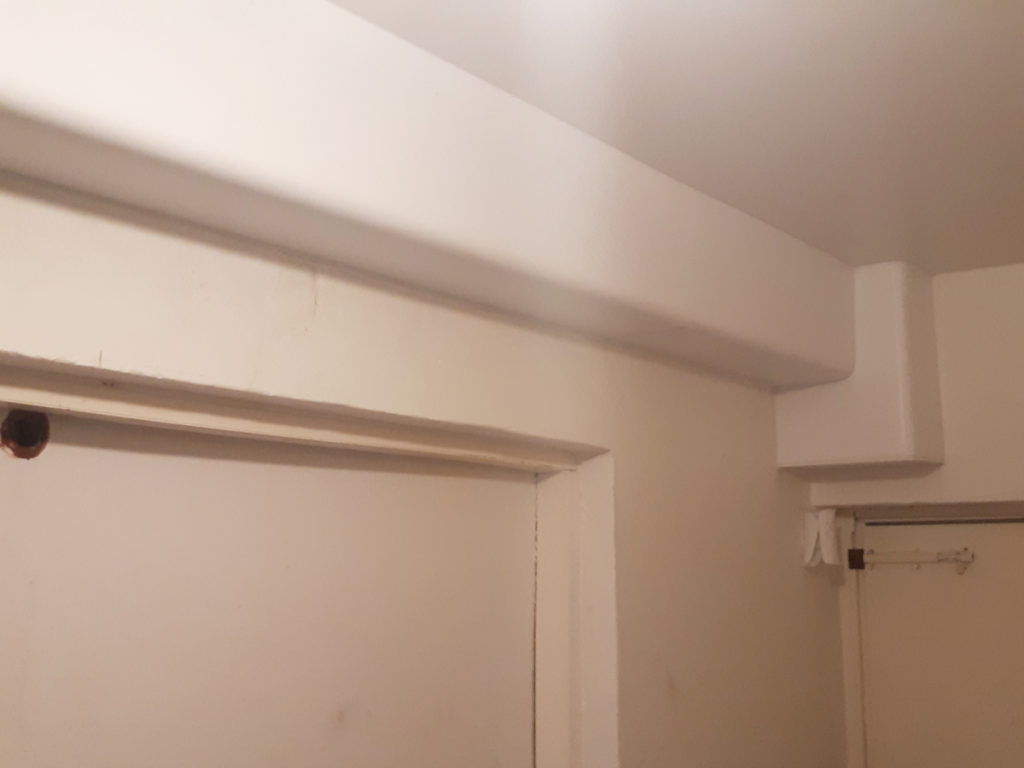
A significant proportion of the pipe boxing is being manufactured by Pendock. Managing Director Richard Braid says: “It’s essential for occupants to feel comfortable with the sprinkler system installations, and the way they look is really important. For this reason, most councils invest in pipe boxing, and the finished job should be neat, tidy and discreet. In each tower block in Birmingham, a pilot flat is produced for initial sign off, which tenants have access to – this usually reassures them about the aesthetics and quality of workmanship.”
Pendock has a UK factory, and Richard Braid believes British manufacturing offers a real benefit for a major programme of this kind, which requires flexibility. Richard continues: “Flats in tower blocks typically have different internal layouts – even within the same building if modifications have been made – and site drawings very often differ to reality. When ordering pipe boxing and the associated accessories for multiple properties, it’s therefore impossible to have a universal blueprint or to take a one-size-fits-all approach.
“As a British manufacturer, we have complete control over our production and delivery processes and can adapt to meet the requirements of a project of this size. Being agile and flexible, we can swiftly make changes in order to meet deadlines and project timescales.”
Resident engagement
Tenant communication is proving to be key to the success of the project. Sharon says: “After the Grenfell tragedy, we carried out visits to all tenants living in high-rise accommodation to ensure we were listening to them and understood their concerns. We continue to talk to our tenants about fire safety, and good communication and engagement are crucial for the sprinkler system programme. It’s vital that we involve tenants as much as possible; it’s going to affect them and their homes.
“In the weeks before work starts in an individual block, tenants are invited to a customer engagement launch meeting, where they can ask questions and find out more about the installation process. Tenants are also kept up-to-date with progress through our local housing teams and representatives from our contractors.
“We appreciate that tenants have questions about when the work will be carried out, and what the systems look like and how they work. People sometimes have concerns about the technology, for example whether cooking appliances can accidently set sprinklers off and when they’ll need to be replaced. We have tried to answer these kinds of questions through adding information, the schedule of works, FAQs, a fire safety video and installation images to our website, but residents can always contact us or our contractors if they have any queries or concerns.”
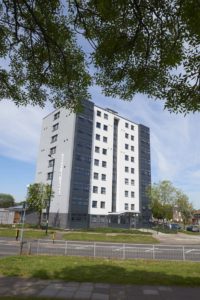 Daniel adds: “Residents are given full information about the works. At the launch meetings, we show videos of the benefits sprinklers provide, dispel the many urban myths about how domestic sprinklers work, and take comments from customers. Feedback’s been very positive; people are generally happy to have sprinklers once they understand the reality of how they work.
Daniel adds: “Residents are given full information about the works. At the launch meetings, we show videos of the benefits sprinklers provide, dispel the many urban myths about how domestic sprinklers work, and take comments from customers. Feedback’s been very positive; people are generally happy to have sprinklers once they understand the reality of how they work.
“We work very closely with the council, meeting bi-weekly. We meet our seven main subcontractors weekly to get an overview on performance and progress and to cover any issues. We have four work streams operating simultaneously; each has a dedicated site manager and tenant liaison officer on site. We also have a dedicated QS and project manager.”
Improving the lives of individuals
Paul Bingham, Regional Director of ENGIE, says: “We meet all the subcontractors regularly. Some meetings are operational and site-based, while others cover logistics, progress and long-term planning. We also meet with the purchasing and operations teams that are dedicated to ensuring we meet project timescales.”
Being involved with the project is something to be proud of, as Paul explains: “We are extremely proud to be involved in installing sprinkler systems to high-rise accommodation on behalf of Birmingham City Council as part of our ongoing and long-term partnership for delivering repairs, maintenance and improvements. ENGIE is committed to improving the lives of individuals and communities across Birmingham, and the installation of sprinkler systems, along with other proactive measures and improvements across the city, is a shining example of the commitment Birmingham has to its customers and residents. We are proud to have played a part in these safety improvements and are happy that our partnership with Birmingham City Council continues to go from strength to strength.”
Lobbying government
Despite all the positives, financially, it has not been an easy journey for Birmingham City Council. While the Housing, Communities and Local Government Committee recommended that ‘the Government should make funding available to fit sprinklers into council and housing association-owned residential buildings above 18 metres’, the Government has not provided any sprinkler system funding to Birmingham City Council, or to any others.
Birmingham City Council is actively lobbying the Government to help pay for fire suppression measures in the country’s local authority residential tower blocks, with Sharon Thompson leading a national delegation to 10 Downing Street last year. She delivered a letter calling for urgent funding, signed by senior politicians from 15 other councils and the Greater London Authority.
Sharon says: “£31m is a huge cost for a single authority to bear. In a time of austerity, when local authorities across the country are having to make significant savings and need to make some really tough financial choices, we need the Government to work with us and enable the recommendations put forward by experts to be implemented for the safety of citizens across the country.”
Birmingham City Council says there is growing support for the retrofitting of sprinklers, which is backed by the All-Party Parliamentary Fire Safety and Rescue Group, National Fire Chiefs Council, the Royal Institute of British Architects, the Fire Brigades Union, the Association of British Insurers, the Fire Protection Association, London Fire Brigade and the Fire Sector Federation.

